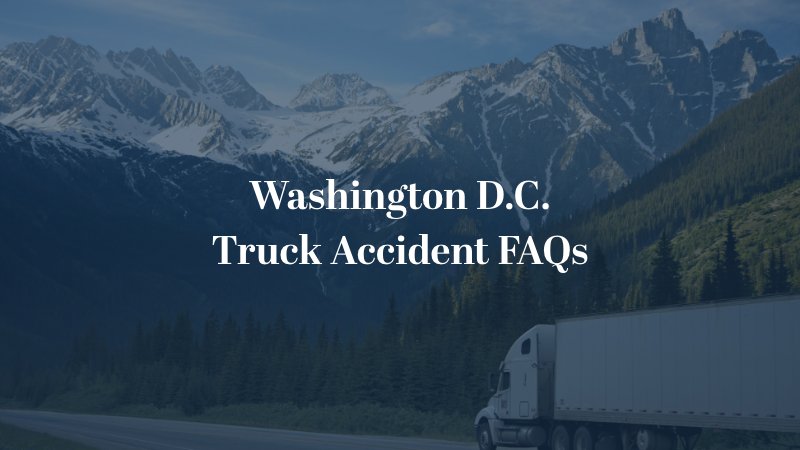Truck accidents are often more severe than typical car crashes because of the size and weight of commercial vehicles, leaving victims with huge medical bills, lost wages, and long-term physical or emotional injuries. When you or a loved one is in a truck accident, learning about your legal rights and options can be crucial for protecting your future. Below are some commonly asked questions that can help you better understand the process and your next steps. Call our truck accident attorneys in Washington D.C. for legal representation.
What Are the Common Causes of Truck Accidents?
When it comes to truck accidents, several factors can increase the risk of a serious collision.
- Driver Fatigue: Long, grueling hours on the road can result in drivers operating on limited sleep, affecting reaction times and overall alertness.
- Distracted Driving: Checking phones, using GPS, or messing around with other in-cab technology can easily draw a driver’s attention away from the road.
- Improper Loading: When trucks are overloaded or cargo isn’t secured correctly, the vehicle’s balance can be thrown off, raising the likelihood of rollovers or other accidents.
- Poor Maintenance: Maintenance issues – like tire or steering problems – can stem from inadequate upkeep and lead to devastating accidents.
- Weather Conditions: Heavy rain, snow, or ice can create slippery roads and limit visibility, making it harder for trucks to stay in control.
Staying alert to these factors and knowing how they play a role in these types of crashes can help you better protect your rights after a truck accident.

What Types of Compensation Can I Receive After a Truck Accident?
Victims of a truck accident may receive compensation for medical expenses, lost wages, and property damage. They can also seek payment for pain and suffering, mental anguish, or ongoing rehabilitation costs if serious injuries require long-term care.
Who Can Be Held Liable in a Truck Accident?
When pursuing compensation after a truck accident, several parties may share liability depending on the circumstances.
- Truck Driver: Careless driving, speeding, fatigue, or distracted behavior might make the driver personally responsible.
- Trucking Company: If the company failed to maintain vehicles or pushed drivers to exceed legal driving hours, it could face liability.
- Vehicle Manufacturer: Hidden defects or poor-quality parts may place blame on the maker of the truck or specific components.
- Maintenance Crew or Mechanic: Improper inspections or substandard repairs can contribute to a crash and lead to liability.
- Victim Responsibility: In Washington, DC, the pure contributory negligence rule applies, meaning that if the victim is found to share any fault – even the smallest amount – they might be barred from recovering damages.
How Do I Prove Fault in a Truck Accident?
Proving fault involves collecting evidence such as police reports, witness accounts, internal employment documents, and any video footage from dash cams or traffic cameras. Accident reconstruction experts can also help show how the crash happened, and trucking records or driver logs may point to issues like driver fatigue or poor vehicle maintenance.
How Long Do I Have to File a Claim After a Truck Accident in Washington D.C.?
In Washington, D.C., you generally have three years from the date of the truck accident to bring a personal injury case. Acting sooner rather than later often makes a big difference in building a solid claim, because important evidence – like photographs, medical records, and witness memories – can fade over time. Reaching out to an auto accident attorney right away helps preserve the proof you need and ensures you don’t miss critical deadlines.
These questions just scratch the surface of the things you need to know if you’ve been injured in a truck accident. If you need help with a claim, contact us today to schedule a free consultation with a truck accident lawyer.